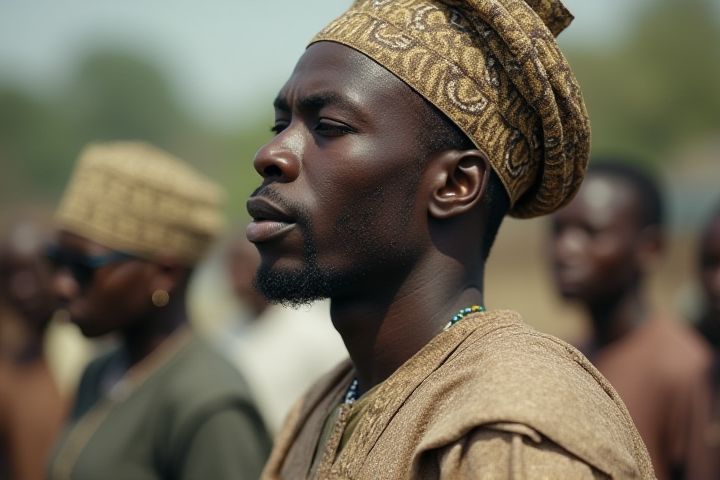
Nigeria operates a federal system of government characterized by a multi-party democracy, where the President serves as both the head of state and government. The country's political landscape is shaped by various ethnic groups, leading to a vibrant yet complex electoral process that reflects diverse interests. Despite its democratic framework, Nigeria faces challenges such as electoral violence, corruption, and political instability, impacting public trust in governance. The Independent National Electoral Commission (INEC) is responsible for overseeing elections, aiming to enhance transparency and fairness. Engaging in civic education and voter participation can empower you to influence the direction of Nigeria's democracy and strengthen its institutions.
Presidential System
The Nigerian democracy operates primarily under a presidential system, where the President serves as both the head of state and government. This system is characterized by the separation of powers among the executive, legislative, and judicial branches, promoting checks and balances within the government. Elections are held every four years, allowing citizens to exercise their right to vote and influence leadership decisions. The vibrant political landscape in Nigeria features diverse parties and movements, reflecting the nation's multifaceted cultural and regional dynamics.
Multi-party System
Nigeria's democracy is characterized by a multi-party system, allowing various political parties to compete for power and influence in governance. The political landscape is dominated by major parties, such as the All Progressives Congress (APC) and the People's Democratic Party (PDP), alongside numerous smaller parties that represent diverse interests and regional identities. This system aims to foster political pluralism and encourage citizen participation in the democratic process, enabling voters to choose from a broad spectrum of candidates. Political elections, driven by the Independent National Electoral Commission (INEC), play a crucial role in shaping Nigeria's democratic framework, ensuring accountability and representation for its populace.
Federal Structure
Nigeria's democracy operates within a federal structure that divides power among three tiers of government: federal, state, and local. This arrangement is designed to accommodate the country's diverse ethnicities and cultures, ensuring representation and autonomy for various regions. You can observe this federal system in action through the allocation of responsibilities such as education, health, and infrastructure, which are managed at different government levels. Additionally, Nigeria's federal structure is enshrined in the 1999 Constitution, aiming to balance power and promote equitable development across the nation.
Constitutional Framework
Nigeria's democracy is grounded in a complex constitutional framework that emphasizes rule of law and separation of powers among the executive, legislative, and judicial branches. The 1999 Constitution serves as the foundation for governance, ensuring fundamental human rights and creating mechanisms for power distribution among Nigeria's diverse ethnic groups. Regular elections, governed by the Independent National Electoral Commission (INEC), are an essential feature of this framework, aimed at promoting political accountability and public participation. Understanding this constitutional landscape is crucial for appreciating Nigeria's ongoing efforts towards democratic advancement and national unity.
Military Rule History
Nigeria's democracy has been significantly shaped by its tumultuous history of military rule, which lasted for several decades post-independence in 1960. Various military coups, driven by political instability and corruption, led to a series of authoritarian regimes that repressed civil liberties and stifled political dissent. The transition to civilian rule began in 1999, marked by the election of Olusegun Obasanjo, which was a pivotal moment in reclaiming democratic governance. Understanding this complex history is crucial for appreciating Nigeria's ongoing challenges in achieving stable and representative democracy today.
Electoral Commission
The Independent National Electoral Commission (INEC) plays a crucial role in shaping democracy in Nigeria by overseeing free and fair elections. Established to manage the electoral process, INEC is responsible for voter registration, election management, and ensuring compliance with electoral laws. Your engagement in the electoral process is vital, as it empowers INEC to promote transparency and accountability within the political system. By fostering public trust in elections, INEC contributes to the strengthening of democratic governance in the nation.
Political Instability
Political instability in Nigeria significantly undermines its democratic processes, leading to frequent changes in leadership and pervasive corruption. The country grapples with ethnic tensions and militant groups, particularly in the northern and southeastern regions, creating an environment of insecurity that hampers voter participation. Structural issues such as inadequate electoral commission resources and lack of public trust in electoral outcomes further exacerbate the situation. As a citizen, your engagement in civil society and advocacy for transparency can help strengthen democratic institutions and promote stability.
Corruption Challenges
Corruption remains a pervasive challenge in Nigeria's democratic framework, undermining governance and public trust. Institutional corruption, often evidenced through embezzlement and bribery, hampers economic development and the delivery of essential services. Civil society organizations actively combat these issues, advocating for transparency and accountability in government operations. By implementing anti-corruption measures and promoting civic engagement, you can contribute to fostering a more resilient democratic environment in Nigeria.
Civic Participation
Civic participation in Nigeria is crucial for strengthening its democracy, as it empowers citizens to engage actively in governance. Grassroots movements, community-based organizations, and civil society groups play a significant role in raising awareness and fostering public dialogue on political issues. Voter education initiatives aim to enhance electoral participation, encouraging you to exercise your rights and responsibilities during elections. Additionally, social media platforms are increasingly utilized to mobilize citizens and amplify their voices, making civic engagement a dynamic facet of Nigeria's democratic landscape.
Ethnic Diversity and Politics
Nigeria's democracy is profoundly influenced by its ethnic diversity, with over 250 distinct ethnic groups, including the Hausa, Igbo, and Yoruba, shaping its political landscape. Ethnic identity often informs political allegiances, resulting in power dynamics that reflect regional interests and cultural affiliations. This diversity presents both challenges and opportunities, as political leaders must navigate complex inter-ethnic relations while promoting national unity. Engaging with this multifaceted societal fabric allows for a more inclusive approach to governance, fostering a sense of belonging and representation among various groups.
